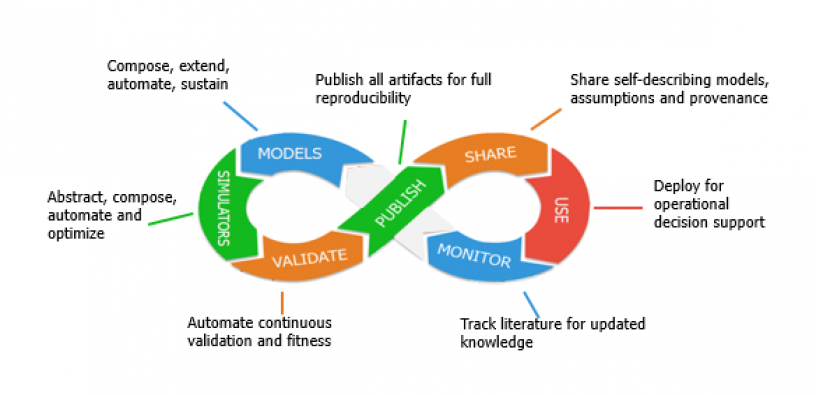Summary

To support the demands of complex, modern-day systems, computational models and simulators have become the primary artifacts for encoding, propagating, and applying expert knowledge to real-world science and engineering problems.
For example, it’s unlikely one would build a new aircraft, rocket, or car engine without first conducting exhaustive simulations using a computational model of the design. The outputs of computational models from many domains, including social and biophysical sciences, are even written directly into policy and regulation at every level of administration, making modeling and simulation critical for Department of Defense operational and strategic planning, and analysis.
Despite this importance, the process of discovering, creating, maintaining, validating, and using expert knowledge and models remains manual, time-consuming, and prone to technical and conceptual errors. For example, current modeling pipelines fail to maintain relevant inputs, assumptions, and modeling choices made during development.
Rapidly changing knowledge, semantically-opaque models, and black-box simulators make it almost impossible to maintain a coherent approach to scientific modeling and simulation, resulting in poor expert decision-support.
Building on the Automating Scientific Knowledge Extraction (ASKE) Artificial Intelligence (AI) Exploration effort, DARPA’s Automating Scientific Knowledge Extraction and Modeling (ASKEM) program will use AI approaches and tools to create, sustain, and enhance complex models and simulators.
These tools will enable experts to maintain, reuse, and adapt large collections of heterogeneous data, knowledge and models – with traceability across knowledge sources, model assumptions, and model fitness. Program performers will apply the models and simulators to various use cases with a focus on modeling of viral epidemics such as COVID-19, and to the causes and impacts of space weather.
If successful, ASKEM will enable a dramatic acceleration in scientific and engineering advances, improve scientific collaboration, and lead to timelier and more reliable expert guidance to support threat detection, interventions, and decision-making, especially in rapidly evolving environments and mission-critical domains.
